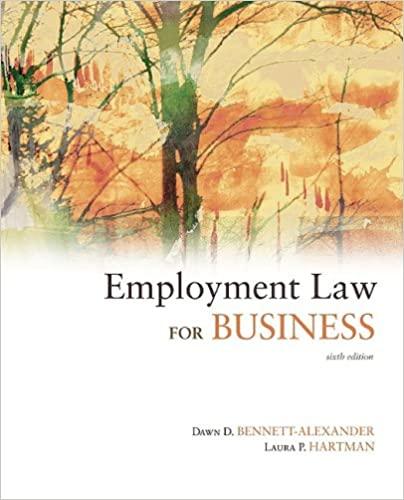Question
Summarize what the paragraphs speak about in an explanation? Pleadings: A pleading is a legal document filed with the court that sets forth the position
Summarize what the paragraphs speak about in an explanation?
Pleadings:
A pleading is a legal document filed with the court that sets forth the position and contentions of a party. Pleadings provide noticeto the defendant that a lawsuit has been instituted concerning a specific contreversy or controversies. It also provides notice to the plaintiff of the defendant's intentions with regard to the suit. Pleadings are part of a larger category of procedural rules. In state court, pleadings are generally governed by state procedural rules.Historically, pleadings could be "notice" pleadings or "fact" pleadings. A notice pleading merely gives notice of the allegation and the reasons for the lawsuit. Rather than offering proof, notice pleadings offer "allegations," which are then proved or disproved during the proceedings. "Fact" pleading, on the other hand, is fact-specific. Today, the federal rules and the rules in most states require only "notice" pleading, leaving the more fact-heavy inquires for motions and trial. All pleadings have the same basic structure, starting with the caption at the top of the first page. The caption states the name of the court at the top and, on the right side of the pleading, the type of pleading, the case number (or docket number), and the name of the judge.
Appeals:
A challenge to a previous legal determination. An appeal is directed towards a legal power higher than the power making the challenged determination. In most states and the federal system, trial court determinations can be appealed in an appellate court. Appeals are usually perfected by the appellant's giving notice of appeal to the trial court and opposing parties. This notice of appeal must be filed within a statutory time period (usually thirty days) after the trial court has entered a final judgment or order. Failure to file the notice of appeal on time denies the appellate court jurisdiction(2018). An appeal of right is one that the higher court must hear, if the losing party demands it, while a discretionary appeal is one that the higher court may, but does not have to, consider. For example, in the federal system, there is an appeal of right from the District Court to the Court of Appeals, but appeals from the Court of Appeals to the Supreme Court are discretionary.
-Tony
Morgan, J. (2018). Business Law (6th Edition). BVT Publishing. https://online.vitalsource.com/books/9781517803971
Legal Information Institute. (n.d.).Appeal. Legal Information Institute. Retrieved November 5, 2021, from https://www.law.cornell.edu/wex/appeal.
Step by Step Solution
There are 3 Steps involved in it
Step: 1

Get Instant Access to Expert-Tailored Solutions
See step-by-step solutions with expert insights and AI powered tools for academic success
Step: 2

Step: 3

Ace Your Homework with AI
Get the answers you need in no time with our AI-driven, step-by-step assistance
Get Started


